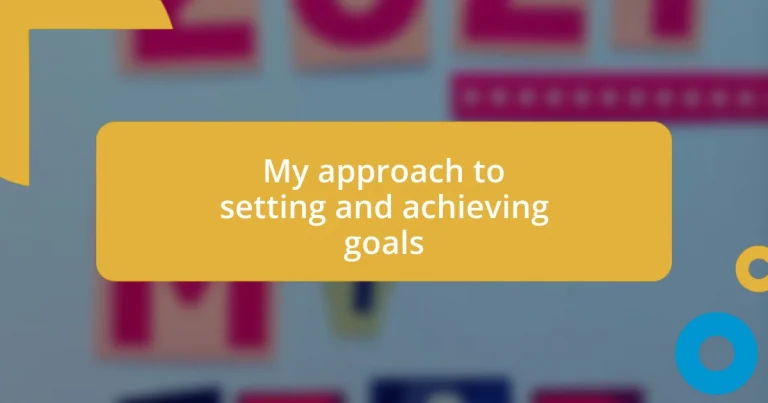Key takeaways:
- Setting clear goals provides direction, motivation, and a way to measure progress, helping navigate life’s challenges.
- Utilizing the SMART framework for goal-setting ensures clarity, accountability, and alignment with personal values and long-term vision.
- Regularly reviewing achievements and involving others in celebrations fosters motivation and strengthens relationships, emphasizing the importance of the journey.
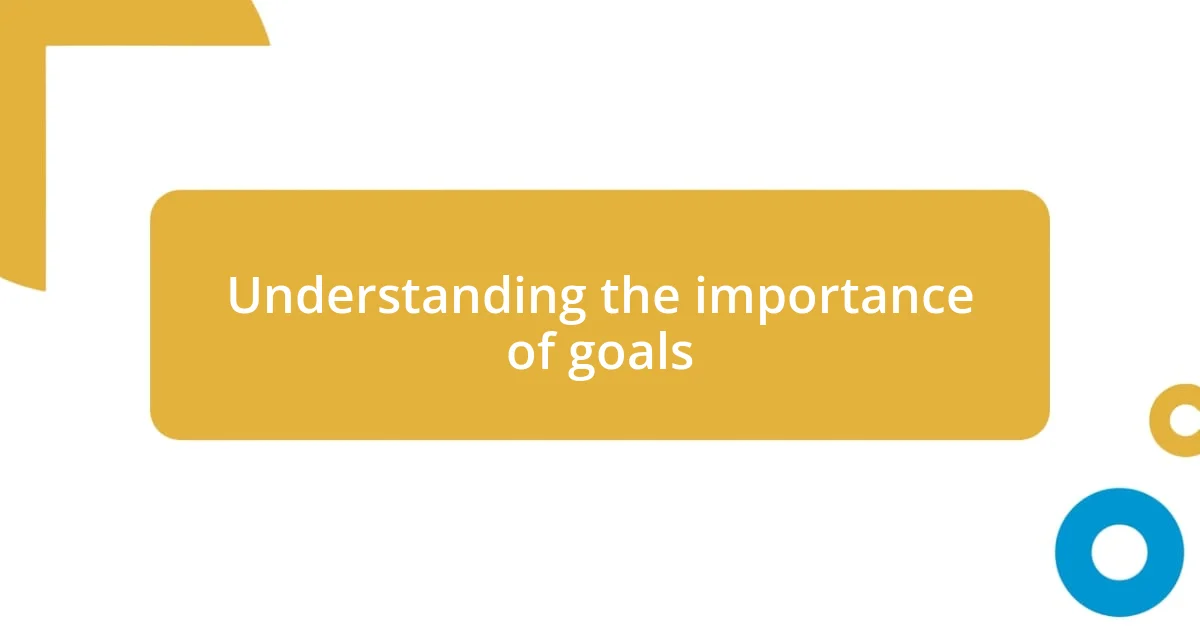
Understanding the importance of goals
Goals act as our guiding stars, illuminating the path we wish to take. I still remember the exhilaration of finally achieving my first marathon goal. The countless early morning runs and the moments of doubt only made crossing that finish line even sweeter. Isn’t it thrilling to think that each goal achieved can be a small victory on our journey?
Setting goals gives us direction, focus, and a tangible way to measure progress. There were days when I felt lost, overwhelmed by life’s demands, but honing in on specific goals helped me regain my footing. I often wonder, how would my life have looked without these signposts?
Moreover, goals foster motivation and resilience, pushing us beyond our comfort zones. I once aimed to learn a new language, and the challenges sharpened my determination. Reflecting on that experience, I can’t help but question: don’t we all grow when we stretch ourselves beyond what we thought possible?
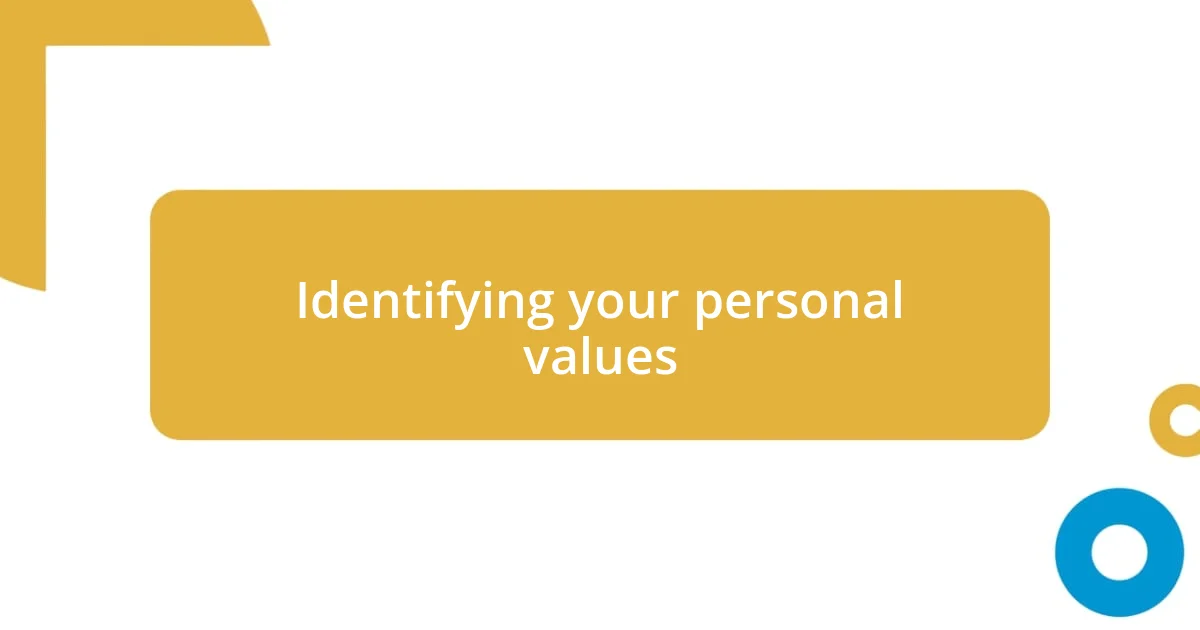
Identifying your personal values
When I think about identifying my personal values, I realize just how fundamental they are to shaping my goals. I recall a time when I faced a career crossroads. I had to choose between a higher-paying job that didn’t resonate with my passion and a lower-paying position in a nonprofit that aligned with my passion for social justice. For me, this moment was a true revelation, clarifying that my core value of making a positive impact far outweighed financial gain.
To start uncovering your values, consider these reflective questions:
- What activities make me feel most fulfilled?
- When do I feel proud of myself?
- Which moments in my life have brought me the most joy?
- What causes do I feel passionate about?
- How do I want to be remembered?
Answering these questions can reveal insights into what truly matters to you, helping you align your goals with your values.
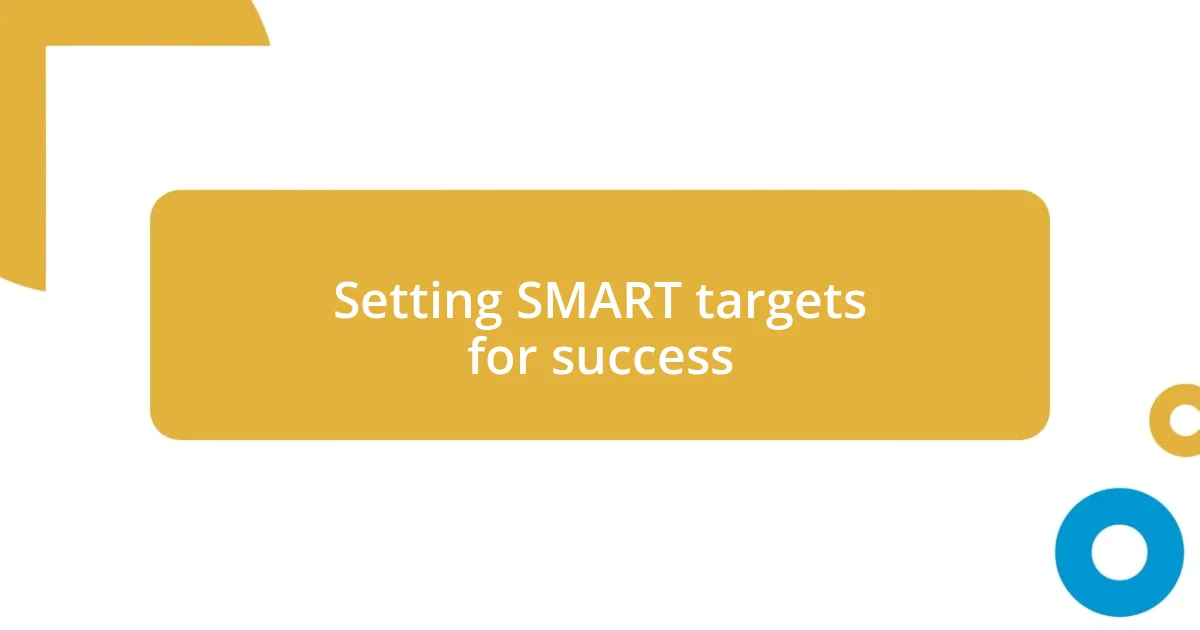
Setting SMART targets for success
Setting SMART targets is a powerful strategy that can significantly enhance the goal-setting process. Specifically, SMART stands for Specific, Measurable, Achievable, Relevant, and Time-bound. Thinking back to when I wanted to improve my public speaking skills, I realized that instead of just saying, “I want to be a better speaker,” I could set a SMART goal: “I will deliver a 10-minute presentation at my local community center in three months.” This clarity made the journey not only manageable but also exciting.
Creating SMART targets encourages not just clarity but accountability. I vividly recall a period when I had to prepare for a job interview. Instead of vaguely preparing, I set a SMART goal: “I will research the company, prepare answers to ten common questions, and practice with a friend by next week.” This structured approach kept me focused, reduced anxiety, and ultimately boosted my confidence leading up to the big day.
In my experience, using the SMART framework not only helps in achieving short-term objectives but also sets the foundation for long-term success. When considering the bigger picture, I often reflect on how these targets paint a roadmap for my ambitions. For example, while pursuing my fitness goals, a SMART target like “I will run a 5K in under 30 minutes within two months” ensures that I’m not just running aimlessly but progressing in a meaningful way.
| SMART Criteria | Explanation |
|---|---|
| Specific | Clearly define the goal. |
| Measurable | Establish criteria for tracking progress. |
| Achievable | Ensure the goal is realistic and attainable. |
| Relevant | Align the goal with your larger objectives. |
| Time-bound | Set a deadline for goal completion. |
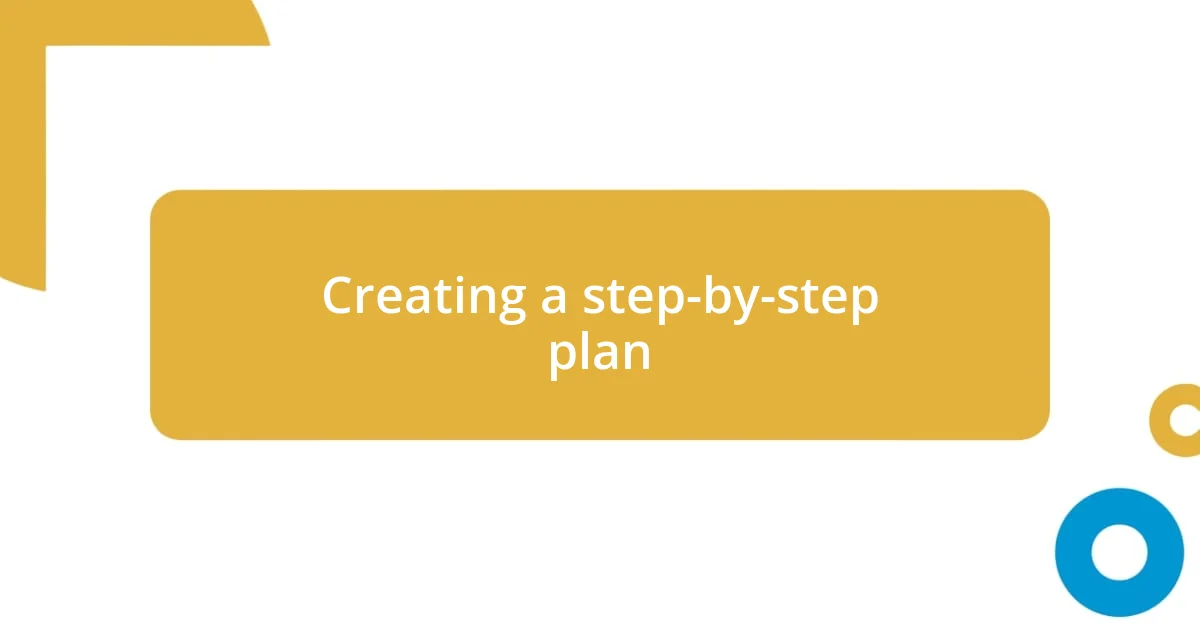
Creating a step-by-step plan
Creating a step-by-step plan transforms the daunting journey of achieving a goal into a series of manageable tasks. I remember when I wanted to launch my own blog. Rather than being overwhelmed by the idea of writing and managing a website, I broke it down. First, I set a timeline to choose my niche, then I researched hosting platforms, and finally, I dedicated specific days to writing content. This clarity made every step feel achievable, turning my dream into a reality.
Breaking down your goals into smaller, actionable steps invites a sense of accomplishment along the way. For instance, when I aimed to learn guitar, I didn’t just think about playing my favorite song out of the gate. Instead, I outlined a plan: week one, learn basic chords; week two, practice strumming patterns; and by week three, start piecing them together. This systematic approach not only kept me motivated but also helped me celebrate little victories — each chord progress felt like a mini celebration.
At times, I find myself asking, “What’s the best way to stay committed to this plan?” I’ve discovered that regularly reviewing my steps is essential. After a month of practice, I would check my progress, adjust my learning methods, or celebrate milestones. By doing so, I turned what could be a forgettable task into a journey rich with reflection and growth. Setting up checkpoints along the way keeps momentum strong and ensures I remain engaged with my goals.
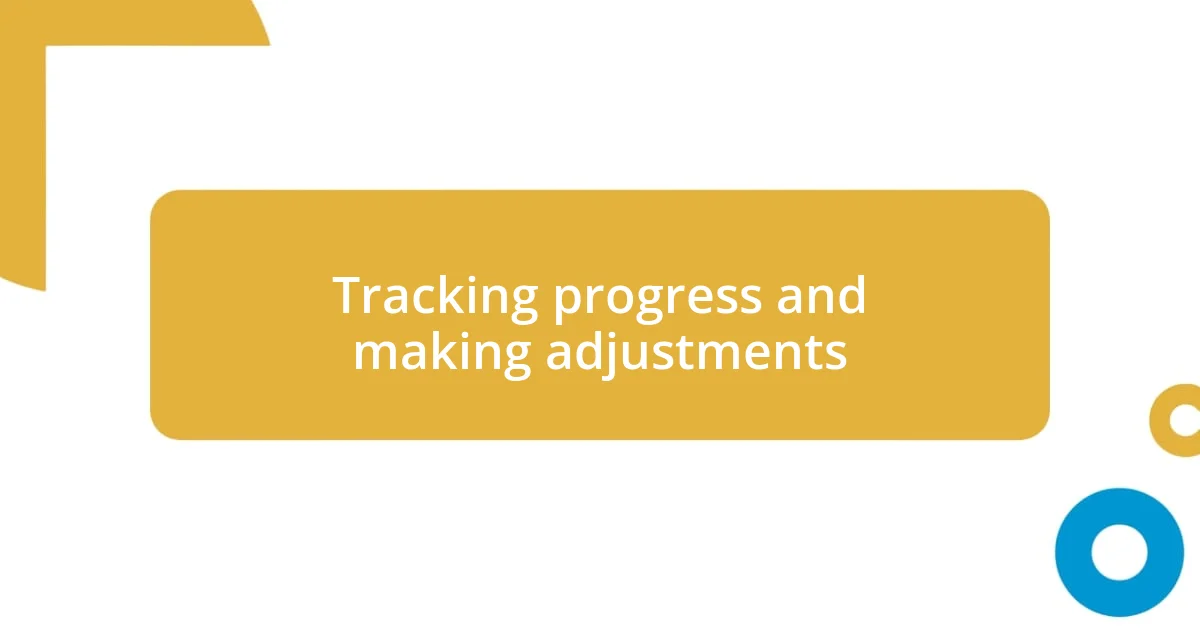
Tracking progress and making adjustments
Tracking progress is an essential part of achieving any goal. I often find that regularly reviewing where I stand helps me gain perspective and stay motivated. For example, when I was training for my first marathon, I used a simple running app to log my distances and times. Every week, I’d look back at my data, and seeing those small improvements fueled my enthusiasm. It was like a little cheerleader reminding me that every step, no matter how small, was leading me closer to the finish line.
Sometimes, I realize that sticking to the original path might not be ideal. Like when I decided to learn Spanish; my initial plan was to study for an hour every day. After a few weeks, I found that an hour felt too daunting, and I was losing interest. Rather than giving up, I adjusted my goal to 20 minutes of practice three times a week. This new approach? It rekindled my excitement, and before I knew it, I was re-engaged and even picking up vocabulary faster.
I often ask myself, “What if I don’t hit my targets?” And you know what? That’s okay. It’s crucial to be flexible. In one instance, I set a goal to read a book a week, but life got busy, and I felt overwhelmed. I shifted my expectation to reading bits every evening rather than aiming for a full book. That change turned reading back into a pleasure rather than a chore. Ultimately, tracking progress and making adjustments is not just about hitting targets — it’s about enjoying the journey and learning more about myself along the way.
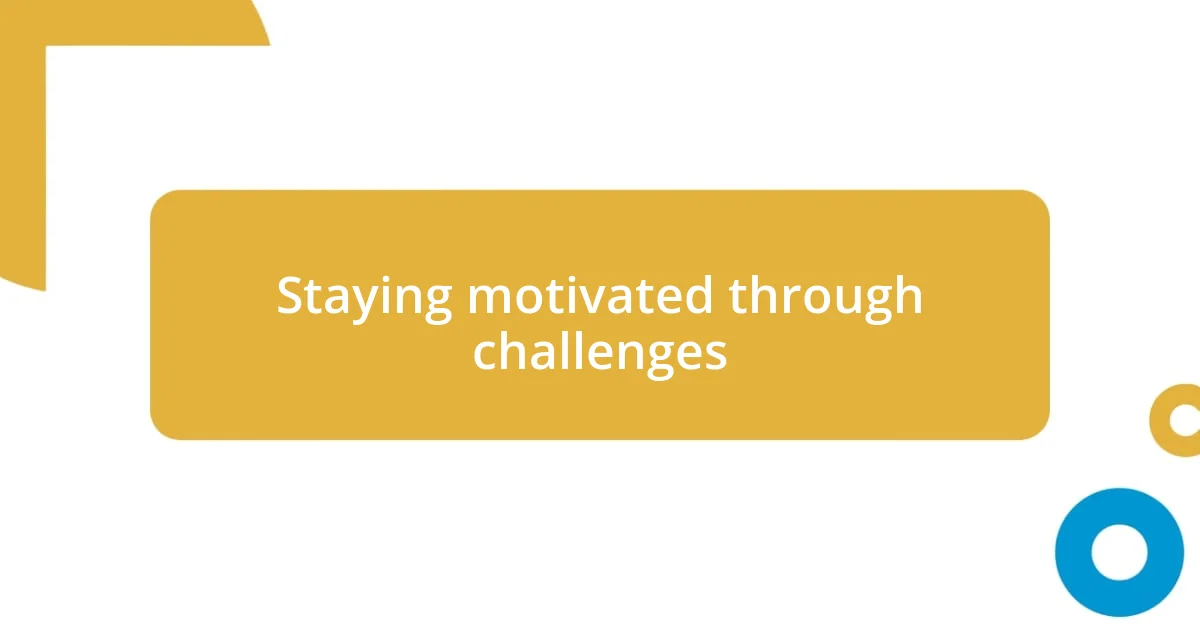
Staying motivated through challenges
Motivation can wane when challenges arise, but I’ve learned that finding inspiration in my setbacks can be a game-changer. I remember facing a tough week while preparing for a big presentation. When anxiety crept in, instead of giving up, I revisited my ‘why’—the passion behind my project. Reminding myself of the impact I wanted to make reignited my drive, helping me push through the discomfort and perform at my best.
Sometimes, I find that talking about my struggles helps ease the burden. I once confided in a friend about my frustration with a fitness goal that felt just out of reach. What surprised me was how much lighter I felt after our chat; she shared her own challenges, and together, we turned our failures into motivation. Isn’t it comforting to know that we all face struggles? Engaging with others can create a sense of camaraderie that fuels perseverance during tough times.
In my experience, setting up small rewards can also lift my spirits when I hit a rough patch. When I was working towards a challenging certification, I set milestones, and for each one I achieved, I treated myself to something special—a nice dinner or a weekend outing. These little celebrations kept me energized and focused on the end goal. What motivates you to keep going when the going gets tough? Finding a personal touchstone can make all the difference in maintaining momentum.
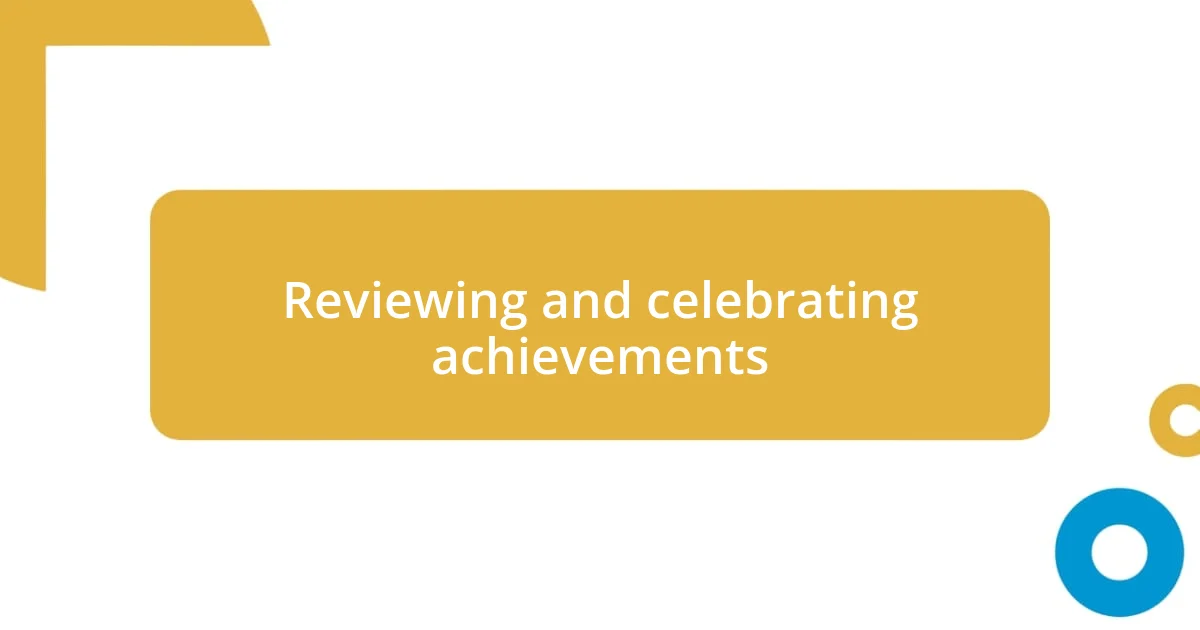
Reviewing and celebrating achievements
Reviewing and celebrating achievements is an integral part of the goal-setting process. I’ve noticed that taking a moment to reflect on my successes—no matter how minor—can recharge my motivation. Once, after completing a challenging project at work, I decided to treat myself to a spontaneous weekend trip. This simple celebration not only acknowledged my hard work but also reinforced the joy of reaching for my goals, making future endeavors feel worthwhile.
I often find that looking back at my achievements can help me appreciate the journey more deeply. There was a time I set a goal to improve my public speaking skills. After the first few presentations, I felt uncertain about my progress. However, when I watched a video recording of my earlier efforts, I was amazed at how much I had grown. Recognizing that growth stirred a sense of pride in me that I hadn’t expected. Have you ever documented your improvement? You might be pleasantly surprised by how far you’ve come!
Moreover, I’ve learned to involve the people around me in my celebrations. After finishing a major certification, I hosted a small dinner with friends and family. Sharing my success with them not only made the achievement feel more significant but also created a wonderful memory that I’m still talking about years later. It’s a reminder that achievement isn’t just a solitary victory; it’s a shared experience that can strengthen relationships. What about you? How do you share your achievements with others?












